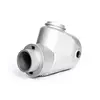Mobile:+86-311-808-126-83
Email:info@ydcastings.com
water pipe end cap
Understanding Water Pipe End Caps A Guide
Water pipe end caps are essential components in plumbing and water management systems. These fittings serve two primary purposes sealing the ends of water pipes and preventing potential leaks or contamination. Whether you are involved in a DIY plumbing project, managing a commercial water system, or simply curious about water infrastructure, understanding end caps can greatly enhance your knowledge and effectiveness in handling water pipes.
End caps come in a variety of materials, including PVC, metal, and rubber. The choice of material typically depends on the specific application, the pressure of the water flow, and environmental factors. PVC end caps are particularly popular due to their lightweight nature, corrosion resistance, and affordability, making them ideal for residential plumbing. Metal caps, such as those made from brass or stainless steel, are more robust and are often used in industrial applications where high pressure or extreme conditions exist.
Installation of water pipe end caps is relatively straightforward. It generally involves cleaning the pipe’s end to ensure a tight fit, applying an appropriate adhesive or sealant for certain materials, and then securely fastening the cap onto the pipe. It’s important to ensure that the cap matches the diameter and threading type of the pipe to ensure a proper seal and avoid any leaks.
water pipe end cap

One significant advantage of using end caps is their role in future-proofing plumbing systems. Whether you’re installing a water supply line that may need to be expanded or isolated, having end caps allows for easy modifications or repairs. By capping off unused lines, you can efficiently manage water flow and pressure throughout your system.
Additionally, end caps contribute to effective drainage systems. They help control the flow of wastewater by providing a sealed environment that can withstand specific pressure, thus preventing backflow and cross-contamination. When installed correctly, they ensure that water flows only where it is intended, safeguarding both public health and environmental quality.
In conclusion, water pipe end caps are crucial for maintaining the integrity of plumbing systems across various applications. Their versatility, ease of installation, and ability to prevent leaks make them invaluable components for both professional plumbers and DIY enthusiasts. As you engage with water management systems, remember that the choice of materials and proper installation techniques can significantly impact the performance and longevity of your plumbing infrastructure. By understanding the role of end caps, you can ensure that your water systems are efficient, safe, and resilient against potential issues.
-
Understanding Metal Casting TechniquesNewsApr.02,2025
-
Understanding Exhaust Manifolds for Enhanced Engine PerformanceNewsApr.02,2025
-
The World of Metal FabricationNewsApr.02,2025
-
Key Components for Pump and Turbo EfficiencyNewsApr.02,2025
-
Essential Tools for Automotive Maintenance and RepairNewsApr.02,2025
-
Durable Valve Components for Effective Water ManagementNewsApr.02,2025











